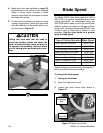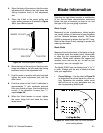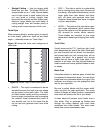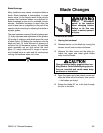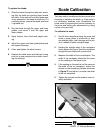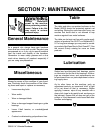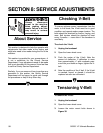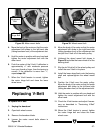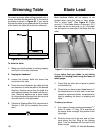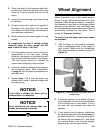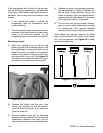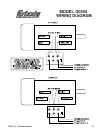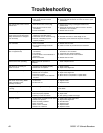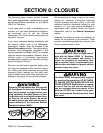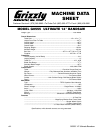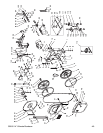
-38- G0555 14" Ultimate Bandsaw
To ensure accuracy when cutting stacked cuts or
circles, the table should also be 90˚ to the back of
the blade as shown in Figure 40. If you should
find that the table is not perpendicular to the back
of the blade, the table will need to be shimmed.
Shimming Table
Figure 40. Squaring table to blade back.
To shim the table:
1. Make sure that the blade is tracking properly
and that it is correctly tensioned.
2. Unplug the bandsaw!
3. Loosen the trunnion bolts that secure the
trunnions to the table.
4. Place shim stock between the table and the
two trunnions to shim the table in the desired
direction. Another way to shim the table is to
add washers between the table and the trun-
nion. Electrical washers are a good choice
for this procedure because they are very thin
and will allow for fine adjustment.
5. Follow the “Aligning Miter Slot” instructions in
Section 4: Set Up to complete this proce-
dure.
Blade Lead
Most bandsaw blades will not appear to cut
straight when using the fence or miter gauge.
This is called “lead.” (See Figure 41.) Lead
occurs (1) if the blade tension is incorrect, (2) if
the teeth are dull on one side, or (3) if the teeth
are set heavier on one side of the blade than the
other.
Figure 41. Blade leading away from line of cut.
If you notice that your blade is not cutting
straight (i.e. leading) while using the fence or
miter gauge:
1. Check that the miter slot or fence is parallel
to the blade line.
2. Check that you have proper blade tension. If
the blade tension is correct and it is not con-
venient to replace the blade, compensate for
lead by skewing the fence or adjusting the
table.
To skew your fence:
1. Cut a piece of scrap wood approximately
3
⁄4"
thick x 3" wide x 17" long. On a wide face of
the board, draw a straight line parallel to the
long edge.
2. Slide the fence out of the way and cut free-
hand along the line. Stop at the halfway
point. Turn the bandsaw off and wait for the
blade to stop.



